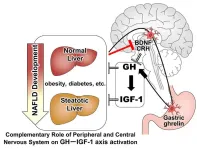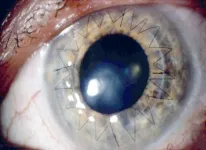(Press-News.org) The sky is no longer the limit — but taking flight is dangerous. In leaving the Earth’s surface, we lose many of the cues we need to orient ourselves, and that spatial disorientation can be deadly. Astronauts normally need intensive training to protect against it. But scientists have now found that wearable devices which vibrate to give orientation cues may boost the efficacy of this training significantly, making spaceflight slightly safer.
“Long duration spaceflight will cause many physiological and psychological stressors which will make astronauts very susceptible to spatial disorientation,” said Dr Vivekanand P. Vimal of Brandeis University in the United States, lead author of the article in Frontiers in Physiology. “When disoriented, an astronaut will no longer be able to rely on their own internal sensors which they have depended on for their whole lives.”
Personal space
The researchers used sensory deprivation and a multi-axis rotation device to test their vibrotactors in simulated spaceflight, so the senses participants would normally rely on were useless. Could the vibrotactors correct the misleading cues the participants would receive from their vestibular systems, and could participants be trained to trust them?
30 participants were recruited, of which 10 received training to balance in the rotation device, 10 received the vibrotactors, and the remaining 10 received both. All participants were shown a video of the rotation device and told how it worked: moving like an inverted pendulum until it reached a crash boundary, unless it was stabilized by a person sitting in the device controlling it with a joystick.
Additional training, for the participants who received it, included tasks that taught participants to disengage from their vestibular sense and rely on the vibrotactors instead of their natural gravitational cues. These tasks involved searching for hidden non-upright balance points, which meant participants had to ignore their desire to align to upright and focus on the vibrotactors.
All participants were given a blindfold, earplugs, and white noise to listen to. Those with vibrotactors had four strapped to each arm, which would buzz when they moved away from the balance point. Each participant took part in 40 trials, aiming to keep the rotation device as close to the balance point as possible.
For half the trials, the rotation device operated on a vertical roll plane. This was considered an Earth analog because participants could use their natural gravitational cues for orientation. During the second half, which acted as a spaceflight analog, the rotation device operated on a horizontal roll plane where those gravitational cues could no longer help.
After each block of trials, participants were asked to rate how disoriented they felt and how much they trusted the vibrotactors. The scientists measured their success by looking at how often they crashed and how well they controlled their balance.
To infinity and beyond
All the groups were initially disoriented in the spaceflight analog. The scientists expected this, because participants could not rely on the natural gravitational cues that they usually use. Nearly all participants reported that they trusted the vibrotactors, but they also reported confusion from conflicts between their internal cues and the vibrotactors.
The participants wearing vibrotactors still performed better than those who only received training. The training-only group crashed more frequently, moved around the balance point more, and accidentally destabilized themselves more often. Receiving the training did help, though. As the trials continued, the group who received both training and vibrotactors performed best.
However, even with training, the participants didn’t perform as well as they did in the Earth analog. They may have needed more time to integrate cues from the vibrotactors, or the buzzing from the vibrotactors may not have given a strong enough danger signal.
“A pilot’s cognitive trust in this external device will most likely not be enough,” said Vimal. “Instead, the trust has to be at a deeper, almost sub-cognitive, level. To achieve this, specialized training will be required.”
If the sensors succeed in more extensive trials, the scientists said, the possible applications for spaceflight are many — from helping astronauts land safely on the surface of a planet, to supporting them as they move outside a vehicle in space.
END
Wearable devices may prevent astronauts getting 'lost’ in space
Disorientation puts astronauts in danger — now scientists have developed wearable vibrotactile devices to keep them on track
2023-11-03
ELSE PRESS RELEASES FROM THIS DATE:
Involvement of brain peptide dynamics in the pathology of fatty liver disease
2023-11-03
Niigata, Japan – The research group of Professor Kamimura in Niigata University have demonstrated the complementary role of peripheral and central nervous system on GH–IGF-1axis activation to prevent MASLD progression. IGF-1 ameliorates fatty infiltration in the liver. Its release is controlled by GH and GH activation is managed by peripheral or central nervous system. However, the role of this axis in MASLD developmental phase has not been well identified. Our study demonstrated that the GH–IGF-1 axis is significant in inhibiting the progression of MASLD. In addition to the peripheral autonomic ...
How to measure improvement in Long COVID identified in an international consensus study
2023-11-03
Researchers have reached an agreement on how best to measure the severity and impact of Long COVID by identifying a “Core Outcome Measure Set” (COMS).
The research, published in Lancet Respiratory Medicine is co-led by the Institute of Psychiatry, Psychology & Neuroscience (IoPPN) at King’s College London and in collaboration with the World Health Organisation (WHO).
COMS are designed to help researchers and clinicians measure symptoms and impacts of disorders such as Long COVID in the same way, which optimises how data can be compared and summarised. Researchers say this will accelerate the understanding of, and the development ...
Human insulin less temperature-sensitive than previously thought
2023-11-03
A new Cochrane review has found that insulin can be kept at room temperature for months without losing potency, offering hope to people living with diabetes in regions with limited access to healthcare or stable powered refrigeration. This affects millions of people living in low- and middle-income countries, particularly in rural areas, as well as people whose lives have been disrupted by conflict or natural disasters.
Human insulin is a hormone produced by the body that helps turn food into energy and controls blood sugar levels. People with diabetes cannot make enough insulin and those with type 1 diabetes have to inject insulin several times a day, typically before every meal. ...
Study reveals untapped potential to increase eye donations needed for sight-restoring surgeries
2023-11-03
EMBARGOED: Not for Release Until 00:01 AM (UK Time) on Friday 3 November 2023
New research highlights the need for routine discussions about eye donation in end-of-life care clinical settings
Less than four per cent of eligible patients in end-of-life care settings were asked to consider eye donation
Patients had positive views about eye donation, but most did not know it could be an option for them
Staff need training and guidance to support discussing eye donation with patients
A new study has found there is significant scope to increase the number of eye donations from patients cared for in hospice and palliative care settings - donations which are desperately needed for ...
Penn Medicine researchers develop gene editing approaches for phenylketonuria treatment
2023-11-02
PHILADELPHIA— Phenylketonuria (PKU) is a rare newborn genetic disease that impacts between 1 in 10,000 to 1 in 20,000 people, depending on the individuals’ genetic ancestry. PKU causes an amino acid—called phenylalanine (Phe)—to build up in the bloodstream. Uncontrolled PKU can lead to intellectual disability, psychiatric issues, and seizures. While current therapies can partially improve outcomes, they require meticulous, lifelong compliance that is very difficult for most patients. ...
Mount Sinai researchers detail mechanism of a key protein implicated in age-related brain dysfunction
2023-11-02
Mount Sinai researchers have shed valuable light on the mechanism of a key protein that regulates the plasticity and function of the hippocampus, a key brain region involved in memory and learning, and that decreases with age in mice.
The team’s findings, published in Molecular Psychiatry, could pave the way for a better understanding of how the protein, known as tissue inhibitor of metalloproteinases 2 (TIMP2), could potentially be targeted in age-related disorders like Alzheimer’s disease to help restore ...
UH researcher tackles mysterious Z-RNA structure and its potential connection to diseases
2023-11-02
University of Houston Assistant Professor of Biology and Biochemistry Quentin Vicens has been awarded a $1.2 million grant from the National Institute of General Medical Sciences to unravel the mystery of Z-RNA – an enigmatic RNA structure within our cells that plays a critical role in immune response. This work is in collaboration with the laboratory of Beat Vögeli, associate professor at the University of Colorado and co-recipient of the award.
Vicens, Vögeli and their research teams are on a mission to understand how Z-RNA forms, how often it appears in our genetic material and what it means for ...
Different antibiotics’ effects on gut microbes may impact hypertensive organ damage
2023-11-02
Highlights
In a preclinical study, altering the intestinal microbiome with narrow-spectrum antibiotics affected organ damage associated with hypertension.
Results from the study will be presented at ASN Kidney Week 2023 November 1–November 5.
Philadelphia, PA (November 2, 2023) — New research in rodents indicates that altering gut microbes may affect the development of organ damage associated with hypertension. The findings will be presented at ASN Kidney Week 2023 November 1–November ...
Are sodium-glucose cotransporter-2 inhibitors safe for patients with diabetes and cancer?
2023-11-02
Highlights
Investigators found that in patients with diabetes and cancer, sodium glucose cotransporter-2 inhibitors were associated with a higher risk of diabetic ketoacidosis and fracture and a lower risk of acute kidney injury and urinary tract infection compared with glucagon-like peptide 1 receptor agonists.
Results from the study will be presented at ASN Kidney Week 2023, November 1–November 5.
Philadelphia, PA (November 2, 2023) — Sodium-glucose cotransporter-2 inhibitors (SGLT2i) have heart- and kidney-related benefits for patients with and without diabetes ...
Wildfire air pollution may increase risks of hospitalization and death among patients on dialysis
2023-11-02
Highlights
Among individuals receiving in-center hemodialysis treatment in Washington, Oregon, and California, exposure to wildfire-related air pollution was associated with elevated risks of hospitalization and mortality.
Results from the study will be presented at ASN Kidney Week 2023 November 1–November 5.
Philadelphia, PA (November 2, 2023) — In analyses of data from western US states, increases in wildfire-related air pollution around dialysis clinics were linked to higher rates of hospitalizations and deaths among patients. The research will be presented at ASN Kidney Week 2023 ...
LAST 30 PRESS RELEASES:
Scientists discover why we know when to stop scratching an itch
A hidden reason inner ear cells die – and what it means for preventing hearing loss
Researchers discover how tuberculosis bacteria use a “stealth” mechanism to evade the immune system
New microscopy technique lets scientists see cells in unprecedented detail and color
Sometimes less is more: Scientists rethink how to pack medicine into tiny delivery capsules
Scientists build low-cost microscope to study living cells in zero gravity
The Biophysical Journal names Denis V. Titov the 2025 Paper of the Year-Early Career Investigator awardee
Scientists show how your body senses cold—and why menthol feels cool
Scientists deliver new molecule for getting DNA into cells
Study reveals insights about brain regions linked to OCD, informing potential treatments
Does ocean saltiness influence El Niño?
2026 Young Investigators: ONR celebrates new talent tackling warfighter challenges
Genetics help explain who gets the ‘telltale tingle’ from music, art and literature
Many Americans misunderstand medical aid in dying laws
Researchers publish landmark infectious disease study in ‘Science’
New NSF award supports innovative role-playing game approach to strengthening research security in academia
Kumar named to ACMA Emerging Leaders Program for 2026
AI language models could transform aquatic environmental risk assessment
New isotope tools reveal hidden pathways reshaping the global nitrogen cycle
Study reveals how antibiotic structure controls removal from water using biochar
Why chronic pain lasts longer in women: Immune cells offer clues
Toxic exposure creates epigenetic disease risk over 20 generations
More time spent on social media linked to steroid use intentions among boys and men
New study suggests a “kick it while it’s down” approach to cancer treatment could improve cure rates
Milken Institute, Ann Theodore Foundation launch new grant to support clinical trial for potential sarcoidosis treatment
New strategies boost effectiveness of CAR-NK therapy against cancer
Study: Adolescent cannabis use linked to doubling risk of psychotic and bipolar disorders
Invisible harms: drug-related deaths spike after hurricanes and tropical storms
Adolescent cannabis use and risk of psychotic, bipolar, depressive, and anxiety disorders
Anxiety, depression, and care barriers in adults with intellectual and developmental disabilities
[Press-News.org] Wearable devices may prevent astronauts getting 'lost’ in spaceDisorientation puts astronauts in danger — now scientists have developed wearable vibrotactile devices to keep them on track



